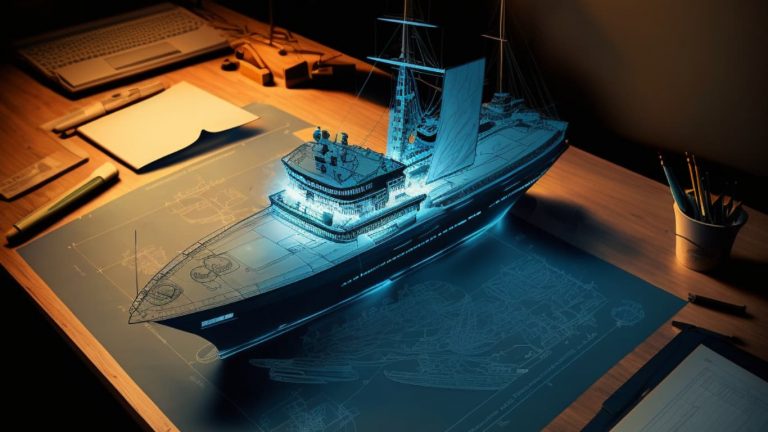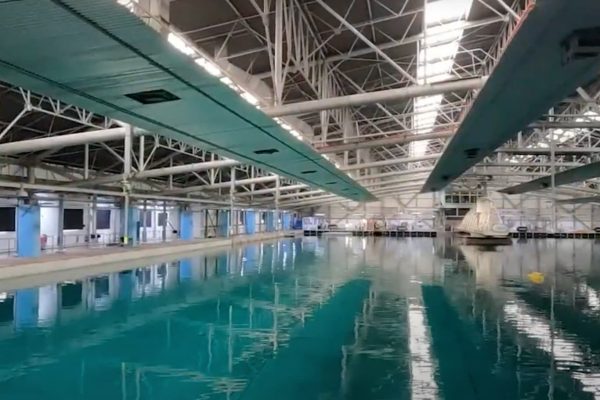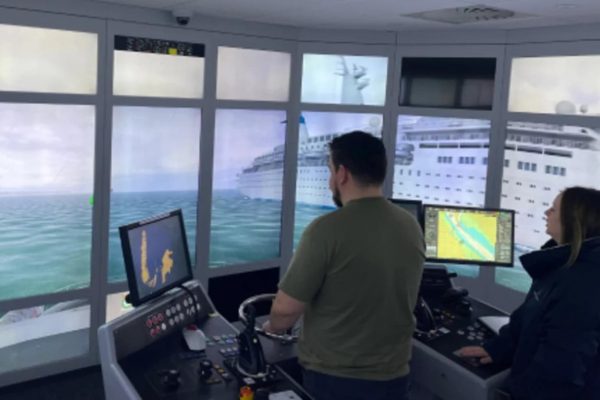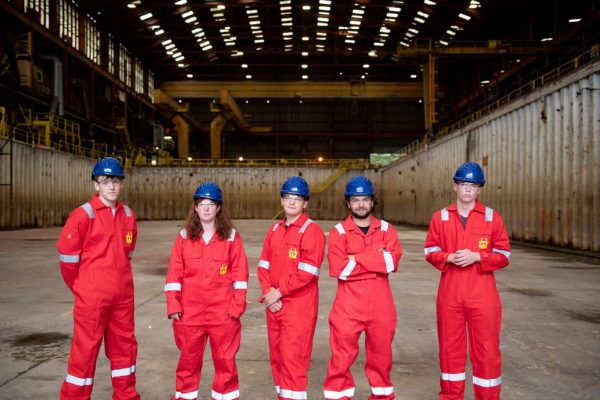As we experience each incoming wave of emergent technology, we also experience rampant speculation about how the technology could integrate and affect each industry. As I write in April 2023, speculation around the utility of AI is in vogue with the public emergence of many so-called Generative AI Systems.
While strides are being made in the arena of augmented reality and virtual reality simulations in maritime training (perhaps slower than anticipated), many emergent technologies for which we have heard the most speculation have failed to actualise in any meaningful sense; Massive Open Online Courses (MOOC), Virtual Campuses, Wearable Technology, Gamification, Blockchain.
But perhaps AI is an exception. With the BBC recently publishing that over 300 million jobs will be impacted by AI, one may assume this will indeed be felt in the world of maritime training.
So, join us, as we speculate the effects of AI in Maritime Training.
Personalised Learning In Maritime Training Utilising AI
Traditionally, maritime training has been a one-size-fits-all affair, with trainees following a predetermined curriculum that assumes a certain level of prior knowledge and experience. However, with the help of AI systems, it’s now possible to tailor training programs to the needs and abilities of individual learners.
Shoreside reached out to Luke Besant, a former lecturer, former number-one tech news podcaster and founder of Magnetic Campus, an organisation that specialises in the marketing of education products and services, for comment.
As AI and machine learning continue revolutionising the maritime training industry, some companies are already leveraging these technologies to create more personalised and effective learning experiences. According to Luke Besant, “A few years ago in the education industry, we had this idea of ‘Digital Aristotle’. The basic premise was we would have a machine so good at understanding the learner’s individual needs that it could effectively adapt a curriculum perfectly in line with the needs of the individual. That’s the big promise of AI in learning; machine learning algorithms analysing data from trainees’ past performance and behaviour and then use that information to create personalised learning plans. For example, if a trainee struggles with a particular topic or task, the AI system can identify the areas where they need more support and provide additional resources or guidance.”
Luke Besant pointed out, “this isn’t like it’s some far-off technology. It’s here now. If we look at what Duolingo are up to with Duolingo Max, it’s easy to see how this can be integrated.”
Of course, there are some challenges and concerns that need to be addressed as AI systems become more prevalent in maritime training. One issue is the potential for bias in algorithms, which could lead to unfair or inaccurate assessments of trainees’ abilities. It’s also important to ensure that trainees have access to the necessary technology and support to make the most of AI-enabled learning tools.
Overall, however, it’s clear that AI has the potential to revolutionise maritime training by enabling more personalised and effective learning journeys. As the technology continues to develop, it will be exciting to see how it can be used to empower the next generation of maritime professionals.
Training To Use AI
As the maritime industry embraces AI and machine learning, it’s becoming increasingly important for maritime trainees to have a solid understanding of these technologies. While the specifics will depend on the individual’s role and specialty, there are a few key areas of AI that are likely to become increasingly important in the near future.
One such area is predictive maintenance, which involves using AI and data analytics to anticipate and prevent equipment failures before they occur. Predictive maintenance relies on machine learning algorithms to analyze data from sensors and other sources, identify patterns and anomalies, and predict when equipment is likely to require maintenance or repairs. By training maritime personnel in predictive maintenance, companies can reduce downtime and maintenance costs while ensuring that their vessels are always operating at peak performance.
Another area of AI that is likely to become increasingly important in maritime training is assisted decision-making. Assisted decision-making systems use AI algorithms to analyse data and provide recommendations to human operators, enabling them to make more informed and effective decisions. In the maritime industry, these systems could be used to analyze weather patterns, route options, and other factors that affect vessel performance and safety. By training maritime personnel in assisted decision-making, companies can improve safety and efficiency, while ensuring that their crews are equipped to make the best decisions possible in a variety of situations.
In a conversation with Shoreside, Luke Besant keenly pointed out, “this is a rare opportunity for accelerated progression within the industry. There will be cadets coming up with a better understanding of these systems than their seniors. […] I’ve certainly experienced this in my industry. When I was coming up, I knew everything about, for example, social media way before even professional marketing managers did. I had brands phoning me up asking me how I got my Myspace so big, and I would say ‘give me five hundred quid and I’ll tell you’ [laughs]. It gave me an incredible ‘wormhole’ to accelerate my career through. I think cadets and trainees in this space should be thinking the same.”
Of course, these are just a few examples of the types of AI systems that are likely to become increasingly important in maritime training. As the technology continues to evolve, it’s important for maritime professionals to stay up-to-date on the latest developments and trends, and to be prepared to adapt to new applications and use cases. By embracing AI and machine learning, the maritime industry can improve safety, efficiency, and performance while preparing the next generation of maritime professionals for the challenges and opportunities of the future.
Exam Enhancement and Proctoring
Another area where AI is likely to impact maritime training significantly is exam enhancement. With the help of AI-powered proctoring and simulation tools, maritime trainees can have a more effective and efficient learning experience while also ensuring that they are fully prepared for the challenges of their role.
One of the most promising applications of AI in exam enhancement is in proctoring. AI-powered proctoring tools use machine learning algorithms to analyse audio and video data during an exam, flagging suspicious behaviour that may indicate cheating or misconduct. This allows exam administrators to identify and address any issues in real time, ensuring that the integrity of the exam is preserved. Additionally, proctoring tools can provide trainees with feedback and support during the exam, helping to reduce anxiety and improve performance.
Another area of AI that is likely to become increasingly crucial in exam enhancement is simulation. AI-powered simulation tools use machine learning algorithms to create realistic, interactive scenarios that allow trainees to practice and improve their skills in a safe and controlled environment. In the maritime industry, these simulations can train crews in various scenarios, from emergency response and safety protocols to navigation and ship handling. By training in realistic simulations, maritime personnel can gain valuable experience and improve their performance in real-world situations.
Of course, some challenges and concerns need to be addressed as AI systems become more prevalent in exam enhancement. One issue is algorithm bias, which could lead to unfair or inaccurate assessments of trainees’ abilities. It’s also essential to ensure that trainees can access the necessary technology and support to make the most of AI-enabled exam enhancement tools.
AI can potentially revolutionise exam enhancement in the maritime industry by enabling more effective and efficient learning experiences. By incorporating proctoring and simulation tools into their training programs, maritime companies can prepare their personnel for their roles’ challenges while ensuring that safety, efficiency, and performance are always top priorities.
Conclusion
AI systems can offer personalised learning experiences, allowing training programs to be tailored to individual learners’ needs and abilities. It is also becoming increasingly important for maritime trainees to have a solid understanding of AI and machine learning, particularly in predictive maintenance and assisted decision-making areas. AI can also enhance exam practices, with proctoring and simulation tools offering a more effective and efficient learning experience.
While there are some challenges and concerns to be addressed, such as algorithm bias, the adoption of AI in maritime training has the potential to revolutionize the industry and prepare the next generation of maritime professionals for the challenges and opportunities of the future.




